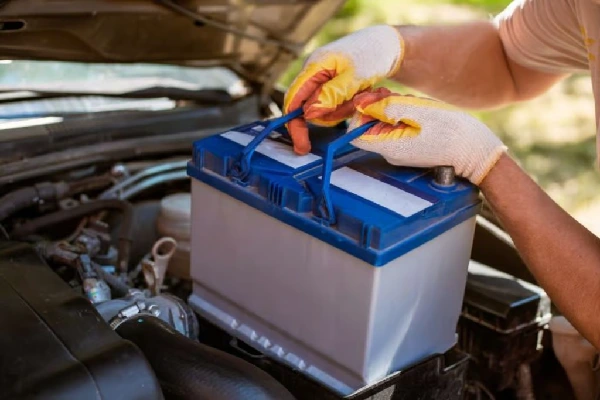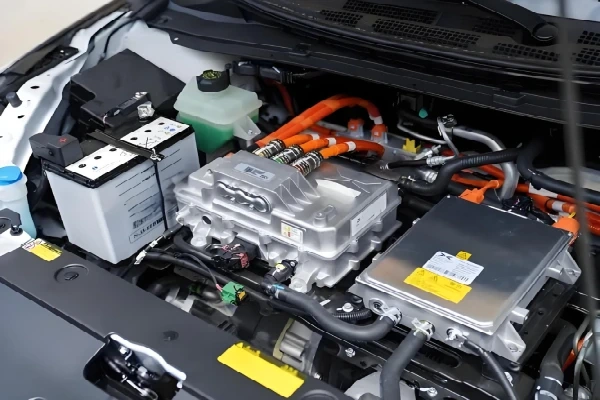Car battery weight might not be the first thing that comes to mind when thinking about your vehicle, but it plays a crucial role in several aspects of car performance and maintenance. In this article, we’ll delve into why car battery weight is important, what affects it, how much a car battery weighs, how to calculate it, and more.
Let’s get started!
Part 1. How does car battery weight affect car performance?

Embark on a quest to unravel the importance of car battery weight, a critical factor influencing your vehicle’s performance and safety.
Car battery weight is significant for a variety of reasons:
- Vehicle Performance: The battery’s weight affects the vehicle’s overall weight. A heavier battery can influence the car’s handling and acceleration. For high-performance vehicles, weight distribution is critical.
- Fuel Efficiency: More weight means the engine must work harder, increasing fuel consumption. A lighter battery can help improve fuel efficiency.
- Longevity of Components: The additional weight from a heavy battery can put extra strain on the vehicle’s suspension and other components, potentially leading to more frequent repairs and maintenance.
- Safety and Installation: Knowing the weight is essential for proper handling during installation and ensuring the battery is securely mounted.
Part 2. Car battery structure
Understanding the components of a car battery helps in grasping why they weigh what they do. A standard car battery typically includes the following:
- Lead Plates: These are the primary weight contributors. Lead is dense and heavy, which provides the necessary energy storage capacity.
- Electrolyte Solution: Usually a mix of sulfuric acid and water, this solution facilitates the chemical reactions needed to produce electricity.
- Plastic or Metal Casing: The outer shell that protects the internal components. While not extremely heavy, the casing does add to the total weight.
- Connectors and Terminals: Made of metal, these parts add some weight, though they are relatively minor compared to the lead plates and electrolytes.
Part 3. Car battery type
Car batteries come in various types, each with unique characteristics and weight profiles:
- Lead-Acid Batteries: The most common type, known for their reliability and affordability. They are, however, the heaviest.
- Lithium-Ion Batteries: These are lighter and more efficient, often used in electric and hybrid vehicles. They provide high energy density but come at a higher cost.
- AGM (Absorbent Glass Mat) Batteries: A type of lead-acid battery that uses a fiberglass mat to absorb the electrolyte. They are lighter than traditional lead-acid batteries and offer better performance.
- Gel Batteries: Similar to AGM batteries, use gel instead of liquid electrolytes. They are used in specific applications where leakage or maintenance is a concern.
Part 4. What affects car battery weight?
Several factors influence the weight of a car battery:
- Battery Type: As mentioned, lead-acid batteries are heavier than lithium-ion batteries.
- Capacity: Batteries with higher energy storage capacity tend to weigh more because they contain more lead plates or other materials.
- Materials Used: The type and amount of materials, such as the lead in lead-acid batteries or the specific metals used in lithium-ion batteries, directly affect the weight.
- Size and Design: Larger batteries naturally weigh more. Additionally, the design and efficiency of the battery can influence weight, with more advanced designs often being lighter.
Part 5. How to calculate car battery weight?
Calculating car battery weight can be straightforward if you have the right information. Here are the steps:
- Check the Manufacturer’s Specifications: Most batteries come with a label that includes weight information.
- Weigh the Battery: If the label is missing, you can use a scale to measure the battery’s weight.
- Consider the Components: If you’re looking to understand the weight distribution, consider the weights of the individual components like lead plates, electrolytes, and casing.
Part 6. How much does a car battery weigh?
Knowing these different car battery weight ranges can help you make an informed decision when selecting a battery for your vehicle.
Here are the typical weight ranges for different types of car batteries:
- Lead-Acid Car Battery Weight: 30 to 50 pounds (13.6 to 22.7 kg).
- Lithium-Ion Car Battery Weight: 10 to 20 pounds (4.5 to 9.1 kg).
- AGM Car Battery Weight: 30 to 45 pounds (13.6 to 20.4 kg).
- Gel Car Battery Weight: 30 to 40 pounds (13.6 to 18.1 kg).
Part 7. Which car battery weighs the lightest?
Among the various types of car batteries, lithium-ion batteries are the lightest. They typically weigh between 10 to 20 pounds (4.5 to 9.1 kg). This significant reduction in weight compared to traditional lead-acid batteries makes them a popular choice for electric vehicles and high-performance cars where weight savings are crucial. Additionally, lithium-ion batteries offer higher energy efficiency and longer life spans, making them an attractive option despite their higher cost.
Part 8. Comparison between heavy car battery and light car battery
You might wonder if a heavier car battery is better. At first glance, it might seem so because heavier batteries, like lead-acid, often have higher capacity and durability. However, this is not always the best choice. Let’s compare heavy vehicle batteries with light vehicle batteries:
1. Heavy Vehicle Batteries (Lead-Acid):
- Advantages: High capacity, reliable performance, and generally more affordable.
- Disadvantages: Adds significant weight to the vehicle, reducing fuel efficiency and putting more strain on the engine and suspension. They also require more maintenance.
2. Light Vehicle Batteries (Lithium-Ion):
- Advantages: Lightweight, improving fuel efficiency and vehicle handling. They have a longer lifespan and require less maintenance.
- Disadvantages: Higher upfront cost and may require specific charging systems.
While heavier batteries like lead-acid might seem like the better option due to their capacity and durability, they come with trade-offs in terms of vehicle performance and efficiency. On the other hand, lighter batteries like lithium-ion offer significant benefits in terms of weight savings, efficiency, and longevity, making them suitable for modern vehicles despite their higher cost.
Part 9. Final thoughts
Understanding car battery weight is crucial for making informed decisions about your vehicle. From the type of battery to the materials used, several factors influence the weight and, consequently, the performance and efficiency of your car. By considering these factors, you can choose the right battery that balances weight, performance, and cost, ensuring your vehicle runs smoothly and efficiently.
Whether you’re a car enthusiast or a regular driver, knowing more about car battery weight can help you take better care of your vehicle. So, next time you’re in the market for a new battery, remember to weigh your options—literally and figuratively—to find the best fit for your needs.
Part 10. FAQs
-
Do different types of batteries have different weights?
Yes, lead-acid batteries are heavier than lithium-ion batteries due to their chemistry. -
Are heavier batteries better for my vehicle?
Not necessarily; lighter batteries can improve fuel efficiency and performance. -
What are the benefits of lightweight car batteries?
Improved fuel efficiency, reduced strain on vehicle components, and enhanced handling. -
How do I choose the right battery weight for my vehicle?
Consider your vehicle’s size, performance needs, and budget when selecting a battery. -
Can I install a lighter battery in my car if it originally had a heavier one?
Yes, as long as the new battery meets the vehicle’s power requirements and fits properly.
Related Tags:
More Articles

Comprehensive Guide to Choosing the Right Cart Battery
Choosing the right cart battery ensures optimal performance and longevity. This guide covers cart battery types and helps you make an informed choice.
The Ultimate Guide to 18650 Button Top Battery
18650 button top batteries are popular for their high energy density and reliability. This guide covers their key features, usage, and maintenance tips.
The Power of Slim: Unveiling the Potential of Flat Lithium Ion Battery
Flat lithium-ion batteries power devices from phones to vehicles. This article explores their design, benefits, types, applications, charging, and safety.
The Comprehensive Guide to Battery Balancing and Battery Balancer
Battery balancing and balancers optimize performance, longevity, and safety. This guide covers techniques and tips for choosing the right balancer.
10 Key Facts About Drone Battery for 2024
Uncover crucial insights with "10 Key Facts About Drone Battery for 2024." Learn the latest trends and essential details on drone batteries.





